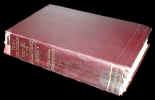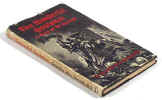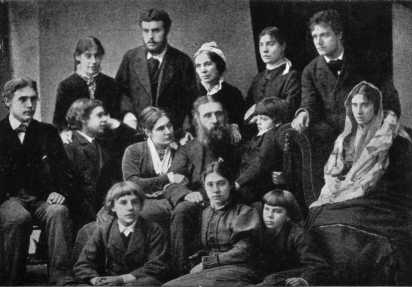
Children
(My complete GMD bio/commentary
is here).
Bibliography
George and Louisa MacDonald had eleven children in all. George would jokingly refer to them as being the "wrong side of a dozen". All of them are pictured here to the right in 1876 along with Mary's fiancé Edward (Ted) Hughes at the far right standing just above Mary who was quite sick by this time and wearing a shawl. Sickness, particularly Tuberculosis, was no stranger to the MacDonalds. George would christen it as being "the family attendant" in later years. It took the lives of four of his children and some of his grandchildren as well.
Lilia Scot MacDonald - 1852-91: If George MacDonald had a favorite daughter it was probably Lily. By all accounts she was the one he depended on the most. She was nursemaid to many of the sick in not only the MacDonald family but several others as well. She died in fact after nursing a friend who had contracted Tuberculosis. It would hardly have been the first time she had played nurse to someone with what was still called consumption in those days, and she did so with full knowledge by then that it was contagious. Before her death, Lily had been known as a wonderful actress from the plays her mother produced. There was much talk of her becoming a full-time actress, but her parents discouraged the notion because of the bawdy reputation actors often had in their day. She was in fact engaged for a time to a young man who broke their engagement because she would not give up acting in her mother's plays. Even though the MacDonald family plays were quite harmless, mostly based on The Pilgrim's Progress and Shakespearian works, acting was still very looked down on by many in the 19th century. A play, directed by Ron Reed, was recently written and performed the summer of 2006 in Vancouver based on the life of Lily MacDonald called, A Bright Particular Star, and opened to very good reviews. It was unfortunately not filmed and there are no plans for the vehicle to tour. The press release for the play was as follows:
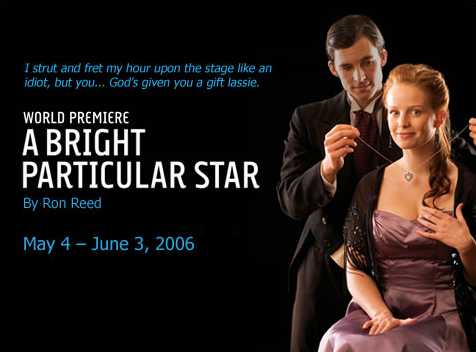
- Victorian social mores forbid Lilia MacDonald from following her theatrical passions, but will they stop her? Pacific Theatre proudly presents the WORLD PREMIERE of A BRIGHT PARTICULAR STAR by award-winning playwright Ron Reed—a rich exploration of even the best of parents’ failures and the beauty within one strong-willed daughter—running May 4 to June 3 at Pacific Theatre in Vancouver.
- World-renowned author George MacDonald and family—Victorian hippies of a sort—take their homemade stage productions on tour across Europe. His daughter Lilia is swept up by the exhilaration of a life in the theatre—spurred on by family friends Mark Twain, Lewis Carroll and even London stage luminary Kate Terry. But faced with competing family expectations, blossoming romance, and an urge to serve London’s poor, can Lilia justify so frivolous a passion?
- Proper Victorian society perceived actresses as glorified sex trade workers, whereas Lilia’s work on behalf of London’s teeming underclass was celebrated. Even today, aspiring theatre artists routinely meet opposition to their vocation from practical-minded parents and overly-cautious religious communities. A BRIGHT PARTICULAR STAR investigates these well-meaning attempts to control others.
- The MacDonalds were rooted in a profound, unconventional Christian faith and they had connections to both the Pre-Raphaelite and Aesthetic movements in art and literature. The brilliant author of the Chronicles of Narnia has said:
- “I regard George MacDonald as my master; indeed, I have never written a book in which I did not quote from him.” ~~C.S. Lewis
- Playwright Ron Reed began work on A BRIGHT PARTICULAR STAR six years ago, with extensive research into the history of George MacDonald’s remarkable family and their world-class circle of friends. Artistic Director and founder of Pacific Theatre (1984), Reed received the Chalmers Canadian Play Award in 1997 for Book of the Dragon, and Tent Meeting (a collaboration with Morris Ertman) was nominated for Toronto's Dora Mavor Moore Award and Edmonton's Sterling Award as Outstanding New Play.
- A BRIGHT PARTICULAR STAR is also directed by Ron Reed (The Lion, the Witch and the Wardrobe Pacific Theatre hold-over cast), and this Emerging Artist Showcase features Rebecca deBoer as Lilia MacDonald (Halo, PT), Kyle Jespersen as George MacDonald (Six Miniature Tragedies, Studio 58/PuSh Festival), Dan Amos (Shadowlands, PT), Jacqui Hoke (A Rattling Sound, Stone’s Throw/PT), Ryan Hoke (The Elephant Man, Five Bob Equity Co-Op), Lori Kokotailo (The Hungry Season, PT), Candice Lindsay (As It Is In Heaven, TWU), Kathleen Parsons (Waiting for Godot, York U) and Stephen Waldschmidt (Chickens, PT).
- Set design is by Stephen Waldschmidt (Leaving Ruin, PT), lighting design is by Mike Dickinson, costume design is by Nicole Bach (Jessie nomination: Chickens), sound design is by Dan Amos (Last Train to Nibroc, PT), with stage management by Lois Dawson.
Mary Josephine MacDonald - 1853-78: A year before the above photograph was taken, Mary had fallen ill with scarlet fever. She who had once been the toughest of the children never fully regained her strength. As was recounted on the Lewis Carroll page of this website, Carroll's brother Wilfred Dodgson taught Mary to box when she was still in good health, and Lewis had named the cat Snowdrop in the second Alice book after Mary's kitten of the same name. She had been engaged to Ted Hughes for four years prior to her death by Tuberculosis. Ted was an artist in his own right and nephew to the artist--Arthur Hughes--who had made so many wonderful drawings for George MacDonald's books.
Caroline Grace MacDonald- 1854-84: Almost nothing is known about the third MacDonald daughter except that she was married in 1881 to a Reverend Kingsbury Jameson despite the fact that she had already contracted tuberculosis a year earlier. Caroline died in 1884. They had a daughter, Octavia, born in 1882, but who also died of tuberculosis at the age of nine.
Greville Matheson MacDonald - 1856-1944: The eldest MacDonald son would become a physician. He also wrote several books, most of them novels, but it was two works of non-fiction for which he is best known. One of them is the biography he wrote of his parents called--George MacDonald and His Wife--which appeared at the George MacDonald Centenary Celebration in 1924. The other is a very complex work titled: The Religious Sense in its Scientific Aspect which appeared in 1903 and was dedicated to his father. In it he gives a detailed analysis of what he refers to as the "religious sense" and its presence in all life forms. He includes examples from the lowly amoeba to the daisy. The religious sense in this case is something along the lines of instinct that causes the various parts of these life forms to work in the service of its other parts, as well as the whole of the creature. He looks at all "work" as such to be representative of the religious sense and the physically manifested source of the Divine to the world, and this manifestation is the source of all physical beauty. The greater the work--the more beautiful. (His father, George, had once said in a letter to his own father that, "God is the God of the beautiful, Religion the love of the beautiful, and heaven the home of the beautiful....") Also included is a discourse on renunciation of self which he also finds present in all life forms and suggests a Law of God behind it. And lastly, he gives a discourse on free-will, which is highlighted by a wonderful story about a cosmic chess game as old as time between the Creator-God and an agnostic. There is no known extant bibliography of Greville's works. Here are the ones known to the author that sits before you:
-
The Religious Sense in its Scientific Aspect
-
The Ethics of Revolt
-
Treatise on Diseases of the Nose and Its Accesory Cavities
-
Count Billy
-
The Wonderful Goatskin: a Tale of St. George
-
Billy Barnicoat: A Fairy Romance for Young and Old
-
The North Door: A Romance
-
Character and Machinery
-
Sanity of William Blake
-
George MacDonald and His Wife
-
Jack & Jill: a Fairy Story
-
The Magic Crook or the Stolen Baby: A Fairy Story
A few covers of Greville's books are:
Irene MacDonald - 1857-1939: Greville gives us almost no information at all about his sister Irene. She did recall for his use in the biography of their parents, the time in Italy that the countryside was subject to several earthquakes over the course of two weeks. Their mother was playing the church organ during the second of the largest quakes. Louisa felt sure the building was going to come down, but rather than cower under a pew, she pulled out all the stops and began to play the Hallelujah Chorus. During this two week period, George MacDonald remained in his study working despite many visitors at his home who had resided to stay out of doors under the olive trees until the shaking had done its worst. Irene recalled one quake at which all the books on her father's shelves had fallen to the floor. "There was a little figure of Christ at the top of one book-case. When all its books were flung to the floor, this figure stood, though it had not been fixed in any way." Irene married a man named Cecil Brewer. She lived to a good old age and died at 82.
Winifred Louisa - 1858-1946: All we know of Winifred (Winnie) was that she married Sir Edward Troup in 1897. Her life as a housewife was probably somewhat overlooked because of the attention given to her husband in light of his public service. He was the chairman of the Health Advisory Committee of the Mines Department for a time as well as several other responsibilities he had at The Home Office where he also served as Permanent Home Secretary starting in 1908. Robert Pittam wrote of him: "But the 1890s and first decades of the 20th century in the Home Office were dominated largely by Edward Troup, who entered the office in 1880 as one of the first open entrants, became Assistant Under-Secretary in 1903, and Permanent Under-Secretary 1908-22. He served in many parts of the office, and when he retired it was said ‘he touched nothing which he did not illuminate'. He was described by Sir Harold Scott who served under him, as a heavy and rather humourless Scot, but in fact his writings often show a wry humour, and he was the first Permanent Under-Secretary to consider delegation of responsibility as a right course in itself, rather than as a regrettable necessity conceded to overwhelming pressure of work. When Troup was promoted he passed over A.H.S. Cunyinghame the Legal Assistant Under-Secretary, an unusual civil servant, who was best known as a practical scientist and Vice President of the Institute of Electrical Engineers; he invented a new safety match, and filled the Home Secretary's room with choking smoke while demonstrating a safety lamp he had invented. He was consoled for non-promotion by the award of a K.C.B. (Knight Commander of the Bath), and retired in 1913."
Ronald MacDonald - 1860-1933: Ronald studied history at Trinity College, Oxford, married in 1888, and brought his new wife, Louise, to the United States, where he had already started a job teaching at Hill School in Pottstown, PA the year before. Ronald soon accepted the job of headmaster at Ravenscroft High School for Boys in Asheville, NC during 1889. Here his wife became ill and died the following year after giving birth to one daughter, Ozella. Lily came to console him and keep house for a time. A few years later he would move back to Great Britain and become an actor/playwright. Here he would meet and wed his second wife, Constance, with whom he had two additional children, a son--Philip--who became a well-known Hollywood screenwriter and detective novelist, and later another daughter--Mary. Ronald also wrote several books, mostly fictional, and co-wrote at least two with his son. He also wrote a terrific, but short, 58-page essay about his father which appeared in a collection of essays about Scottish topics by various authors called: From a Northern Window. Like Greville, no known complete bibliography is available, but what follows are a few of his books & plays.
Plays (some would later become novels)::
-
The Eleventh Hour
-
The Sword of the King
-
The Chief of Staff
-
The Red Herring
-
Gambier’s Advocate
Books:
-
The Sword of the King
-
God Save the King
-
Camilla Faversham
-
The First of the Ebb
-
The Sea Maid
-
A Human Trinity
-
The Election of Isabel
-
The Carcase
-
The Green Handkerchief
-
The Laughing Elf
-
Raymond Lanchester
-
The Red Herring
-
Gambier's Advocate (this story was adapted into a silent movie in 1915).
-
Ambrotox and Limping Dick
-
The Spandau Quid (These last two books were co-written with his son Philip)
And here are two covers from his books:
 |
 |
Robert Falconer - 1862-1913: The only thing known to this author at all regarding Robert falconer is that he eventually became an architect.
Maurice MacDonald - 1864-79: Maurice was a child favorite with everybody, especially his mother. According to Greville he was exceptionally bright and was considered quite a handsome fellow. His young death was a heavy blow to his mother.
Bernard Powell MacDonald - 1865-1928: All that is known about Bernard is that he married in 1890 after a seven year engagement and became a Professor of Elocution at Queen's College, London. He was also a Lecturer on Voice Production at Mansfield College, Oxford.
George MacKay MacDonald - 1867-1909: This is the only mention of MacKay by either Greville or Ronald in their recollections. It's a short mention in a letter written by their mother to her husband in 1891: "MacKay is very sweet and helpful ... and reads in your study and is generally good and slow and dull and funny and kind as his head allows him."
The Star Grandchild: Philip MacDonald - 1900-80
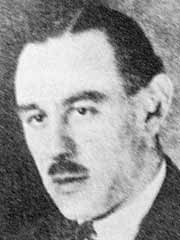
Philip MacDonald, son of Ronald, and
grandson of George, became an extremely successful novelist
and screenwriter. He came to

 America in
1931 after marrying
F. Ruth Howard (who also wrote a few stories, at least one
of which--Dangerous Intruder--was made into a film
in 1945) and wrote numerous stories for film, television,
and radio. He mostly focused on detective mysteries. He had
an ongoing character, a detective by the name of, Anthony
Gethryn, which appeared in many of his books over several
decades. The first called: The Rasp, was probably
the best. The series ended in 1960 with--The List of
Adrian Messenger, which was adapted as a film by John
Houston.
America in
1931 after marrying
F. Ruth Howard (who also wrote a few stories, at least one
of which--Dangerous Intruder--was made into a film
in 1945) and wrote numerous stories for film, television,
and radio. He mostly focused on detective mysteries. He had
an ongoing character, a detective by the name of, Anthony
Gethryn, which appeared in many of his books over several
decades. The first called: The Rasp, was probably
the best. The series ended in 1960 with--The List of
Adrian Messenger, which was adapted as a film by John
Houston.
Here is a list of all the books in the Anthony Gethryn series:
-
The Rasp
-
The White Crow
-
The Link
-
The Noose
-
The Choice
-
The Wraith
|

|
Here are several other books by Philip MacDonald:
-
Gentleman Bill
-
Queen's Mate
-
Patrol
-
Likeness of Exe
-
Rynox, an Exercise in Crime
-
Murder Gone Mad
-
R.I.P.
-
Glitter
-
The Dark Wheel
-
Fingers of Fear, and Other Stories
-
Guest in the House
-
The Man out of Rain, and Other Stories
-
Death and Chicanery, A Collection of Tales
He also wrote books under various pennames.
As Oliver Fleming (these were his first two books and both were co-written with his father, Ronald MacDonald)
-
Ambrotox and Limping Dick
-
The Spandau Quid
As Anthony Lawless:
-
Harbour
-
Moonfisher
As Martin Porlock:
-
Mystery at Friar's Pardon
-
Mystery in Kensington Gore
-
X v. Rex
As W. J. Stuart:
-
Forbidden Planet (which went on to become a famous sci-fi movie)
It wasn't one of John Ford's better films (it was lost and forgotten for some years) but "The Lost Patrol" was based on a novel by Philip called--Patrol. This film came out in 1934; it was a remake however. The film was originally made in 1929 by Walter Summers. The film by Summers is said to follow the book more closely, although most would agree that it wasn't nearly as good as the later John Ford film. An oddity pertaining to both films is that the 1929 film starred Cyril McLaglen, while the 1934 film starred his much better known older brother--Victor McLaglen. Victor is probably known to almost everyone for his famous fight scene in Ireland with John Wayne in another Ford film--"The Quiet Man".
Philip worked on just about every major detective series that came out of Hollywood between 1930 and 1960. He worked on films for such great characters as Charlie Chan, Mr. Motto, and Perry Mason, while also doing some screen adaptations for Alfred Hitchcock and Agatha Christie among scores of others. He was given the Edgar Allan Poe Award for short stories twice.
